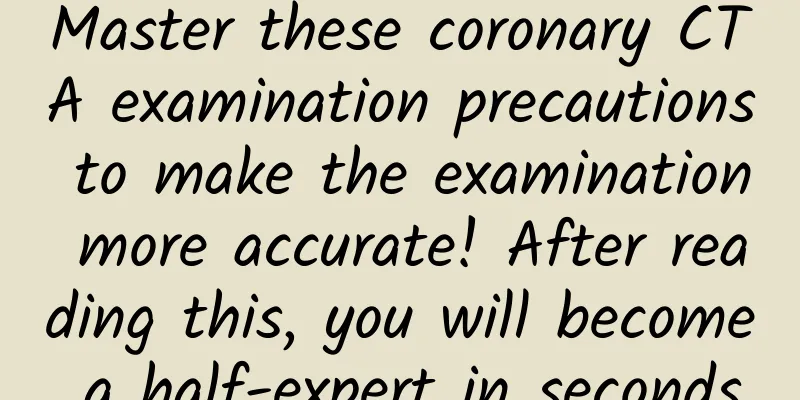Master these coronary CTA examination precautions to make the examination more accurate! After reading this, you will become a half-expert in seconds

|
Coronary CT angiography (coronary CTA) is a non-invasive and rapid heart examination technology that can clearly show stenosis, plaques and other lesions in the coronary arteries, helping to detect coronary heart disease at an early stage. However, if you are not well prepared before the test, it may affect the accuracy of the results and even increase the risk. Here are the key things to pay attention to before, during and after the test to help you complete the test smoothly. 1. Before the inspection: these preparations are essential 1. Confirm whether you are suitable for the examination The following people need to inform their doctor in advance: ① Severe arrhythmia (such as atrial fibrillation, frequent premature beats) or rapid heart rate (usually needs to be controlled below 60-70 beats/minute). ② Allergic to iodine contrast agents, uncontrolled hyperthyroidism, and renal insufficiency (blood test for creatinine level is required in advance). ③ Women who are pregnant or planning to become pregnant (radiation may affect the fetus). 2. Controlling your heart rate is key Coronary CTA requires a stable heart rate during the examination. If the heart rate is too fast or irregular, the doctor may recommend taking beta-blockers (such as metoprolol) to lower the heart rate. Avoid strenuous exercise, coffee or strong tea before the examination. 3. Fast for 4-6 hours before the examination Avoid gastric contents interfering with the image, but drink a small amount of water. If diabetic patients need to stop taking medication, they need to consult a doctor in advance. 4. Pay attention to medication adjustments Diabetic patients taking metformin: You may need to stop taking the drug for 48 hours after the test (the contrast agent may affect kidney function). People who take anti-anxiety drugs or beta-blockers for a long time: Communicate with your doctor in advance whether the dosage needs to be adjusted. 2. During the examination: How to cooperate with the doctor? 1. Stay still and follow the breathing instructions During the examination, you need to lie flat on the CT examination bed with your hands raised above your head. When you hear the "hold your breath" command, you need to immediately remain still and hold your breath for about 5-10 seconds to avoid body movement that may cause blurring of the image. 2. Normal reaction to contrast agent injection When the contrast medium is injected into the vein, you may feel fever, itchy throat, or urge to urinate. This is normal and there is no need to panic. If you experience severe discomfort such as palpitations or difficulty breathing, you must immediately notify the medical staff. 3. After the examination: Pay attention to physical changes 1. Drink more water to promote the excretion of contrast agent After the examination, it is recommended to drink 500-1000ml of warm water to accelerate the excretion of the contrast agent through the kidneys and reduce the risk of kidney damage. People with normal kidney function can usually metabolize it completely within 24 hours. 2. Observe for allergic reactions A very small number of people may experience delayed allergic reactions, such as rash, nausea, etc., which usually resolve on their own within 1-2 days. If symptoms worsen, seek medical attention immediately. 3. Avoid strenuous exercise in the short term Especially for the elderly and patients with cardiovascular diseases, it is recommended to rest for 30 minutes before leaving the hospital after the examination. In general, coronary CTA is a powerful tool for screening coronary heart disease, but a successful examination cannot be achieved without the cooperation of doctors and patients. If you are well prepared for heart rate control, medication adjustment, breathing training, etc., the examination results will be more accurate. If you have underlying diseases or have concerns about the examination, be sure to communicate fully with your doctor in advance and adjust the plan in a personalized manner. Experts from Yiyang Central Hospital remind you: Wear loose clothing on the day of the examination, avoid wearing metal jewelry, and bring previous heart examination reports for the doctor's reference. I hope this popular science article can help you calmly deal with the examination and protect your heart health! Hunan Medical Chat Special Author: Yao Lan and Liu Liang from Yiyang Central Hospital Photo/Chen Xuewen Follow @湖南医聊 to get more health science information! (Edited by ZS) |
>>: To prevent obesity, should you eat like a pig?
Recommend
How to prevent weight gain after eating hot pot? What is the hot pot dipping sauce that will not make you fat?
Every family has a different way of making hot po...
Yellow discharge after cervical polyp surgery
Cervical polyp surgery is the main method to remo...
Postpartum anal fissure pictures
When a woman has anal fissure after giving birth,...
What are the symptoms of taking Gongxueting granules?
The main effect of Gongxueting Granules is to nou...
Will postpartum hair loss be severe and will all hair fall out?
Ten months of pregnancy and one day of delivery. ...
The menstrual period was shortened from seven days to three days
Some people have irregular menstrual cycles, and ...
Why does my breast hurt when I touch it?
Normal breasts are soft and elastic, but if the b...
The woman's bottom is getting darker
Many people have misunderstandings about the colo...
eMarketer: The impact of mobile phones on users' shopping paths
The proportion of users using smartphones and tab...
Is postpartum hair loss caused by calcium deficiency?
Many women are prone to hair loss after giving bi...
Does a small uterus affect fertility?
A small uterus is a sign of uterine dysplasia, wh...
What causes urinary pain during menstruation?
Many female friends have this feeling that there ...
Why does my stomach hurt after sex?
In the life of a couple, making love is a very wo...
What are the symptoms before your period?
Women will have very obvious reactions when their...
What to do if there are no mature follicles? How to regulate
Many female friends have an unscientific lifestyl...









